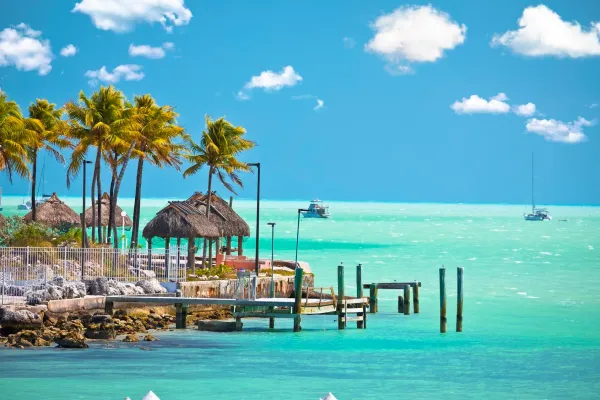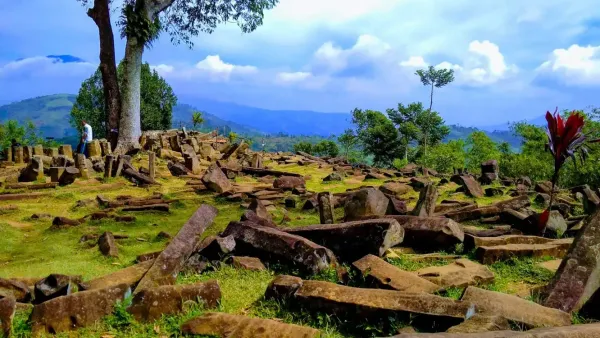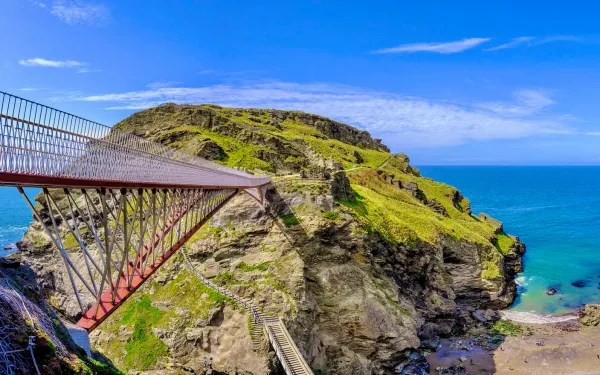The Ultimate Guide to Launching Your Own Travel Blog
Embark on the rewarding journey of starting a travel blog with our comprehensive guide. From niche selection and website setup to crafting engaging content and audience building, each step paves the way for a prosperous blog.

Table of Contents
- Introduction
- Choosing a Niche for Your Travel Blog
- Setting Up a Website and Domain
- Creating Compelling Content
- Building an Audience and Growing Your Blog
- Monetizing Your Travel Blog
- Promoting Your Travel Blog on Social Media
- Collaborating with Brands and Other Travel Bloggers
- Staying Motivated and Consistent
- Recommended Resources for Learning about Travel Blogging
- Is it too late to start a travel blog in 2023?
- Conclusion
- References
Introduction
In today's digital age, travel blogging has become an increasingly popular way for individuals to share their experiences, insights, and adventures with the world. A travel blog allows you to connect with like-minded individuals, inspire others to explore new destinations, and potentially even monetize your platform. However, launching and maintaining a successful travel blog requires careful planning, dedication, and the right strategies. In this ultimate guide, we will explore every aspect of starting your own travel blog and provide you with valuable tips and insights to help you embark on this exciting journey.
When it comes to travel blogging, the possibilities are endless. You can choose to focus on a specific niche or cater to a broader audience. Whether you're passionate about adventure travel, budget backpacking, luxury vacations, or sustainable tourism, finding your niche is an essential first step. Researching popular travel blog niches can help you identify areas of interest and potential audiences. Consider your own passions, expertise, and unique perspective when selecting a niche.By evaluating the market competition and finding a unique angle within your chosen niche, you can stand out and attract a diverse readership. For example, if you choose adventure travel as your niche, you could focus on extreme outdoor activities and share your personal stories of conquering challenging terrains, such as climbing the world's highest peaks or embarking on epic hiking trails.
Choosing a Niche for Your Travel Blog
When it comes to travel blogging, choosing the right niche is crucial. Your niche will define the type of content you create and the audience you attract. Researching popular travel blog niches can help you identify areas of interest and potential audiences. Consider your own passions, expertise, and unique perspective when selecting a niche. By evaluating the market competition and finding a unique angle within your chosen niche, you can stand out and attract a diverse readership.
For example, if you're passionate about sustainable travel, you could focus on eco-friendly destinations, tips for reducing your carbon footprint while traveling, and promoting responsible tourism practices. By narrowing down your focus to a specific niche, you can establish yourself as an expert in that area and build a loyal following of readers who share your interests. Remember, finding your niche is not about limiting yourself but rather about honing in on what sets you apart and what you are truly passionate about.
Setting Up a Website and Domain
Once you have chosen your niche, the next step is to set up a website and domain for your travel blog. Your website will serve as the foundation for your blog and the platform through which you share your content with the world. Selecting a memorable blog name that resonates with your chosen niche and target audience is an important first step. Your blog name should be catchy, easy to remember, and reflective of your travel blog's identity. For example, if your niche is luxury travel, you could choose a name like "Wanderlust Luxe" or "Globe-trotting in Style."
Choosing a suitable blogging platform is also crucial. Popular options include WordPress and Hostinger Website Builder. Consider your personal preferences, technical requirements, and the scalability of the platform when making your decision. WordPress, for instance, is a versatile and customizable platform that offers a wide range of themes and plugins to enhance the functionality and design of your travel blog.
Next, you'll need to set up web hosting with a reputable provider to ensure reliable website performance. Hosting providers such as Siteground or Bluehost offer affordable and reliable hosting options for bloggers. Consider the specific needs of your travel blog, such as storage space and bandwidth requirements, when selecting a hosting plan.
Once you have your domain and hosting in place, it's time to customize your travel blog. Choose an appealing theme that aligns with your brand and niche. Themes provide the visual framework for your blog and can greatly impact the user experience. Look for themes that are responsive, user-friendly, and customizable to suit your specific needs. Additionally, installing relevant plugins can enhance the functionality and features of your travel blog. Plugins such as Akismet Anti-Spam, Wordfence, and Yoast SEO can help you manage spam, enhance security, and optimize your blog for search engines.
Creating Compelling Content
Creating compelling content is the heart and soul of your travel blog. To attract and retain readers, it's important to provide valuable and engaging content that resonates with your target audience. Conduct thorough research to generate blog post ideas that are relevant to the interests and needs of your readers. Consider what type of information they are looking for, the destinations they are interested in, and the experiences they want to learn about.
Developing a unique writing style and voice is also crucial for standing out in the crowded travel blogging space. Your writing should reflect your personal experiences, perspectives, and storytelling abilities. Share your travel adventures, insights, and tips in a way that captivates your readers and inspires them to explore the world.
Incorporating high-quality visuals, such as photos and videos, can greatly enhance the overall storytelling and appeal of your travel blog. Invest in a good camera and learn basic photography techniques to capture stunning images of your travel experiences. Additionally, consider creating videos to showcase your adventures and provide a more immersive experience for your audience.
Building an Audience and Growing Your Blog
Building an audience is a crucial step in the success of your travel blog. It's not just about creating great content; you also need to promote your blog and engage with potential readers.Implementing effective SEO techniques can improve the visibility of your travel blog on search engines, making it easier for readers to discover your content. Optimize your blog posts with relevant keywords, meta tags, and descriptive titles to increase your chances of ranking higher in search engine results.
Social media marketing is another powerful tool for promoting your travel blog and engaging with your audience. Utilize platforms such as Instagram, Facebook, Twitter, and Pinterest to share your content, interact with your followers, and attract new readers. Create visually appealing posts, use relevant hashtags, and encourage your audience to share your content with their networks.
Leveraging email marketing campaigns can also help you connect with subscribers and drive traffic to your blog. Offer a newsletter or exclusive content to incentivize readers to subscribe to your mailing list. Regularly send out updates, travel tips, and exclusive offers to keep your subscribers engaged and coming back for more.
Collaborating with other travel bloggers can be a powerful strategy for expanding your reach and growing your audience. Consider guest posting on established travel blogs or inviting guest bloggers to contribute to your blog. Cross-promotion with other travel bloggers allows you to tap into their audience and introduce your blog to new readers. Additionally, engaging with your readers through comments, responding to their questions, and initiating conversations can help foster a sense of community and loyalty.
Monetizing Your Travel Blog
While passion for travel and sharing experiences is often the driving force behind starting a travel blog, it's also possible to monetize your platform and turn it into a source of income. There are several monetization strategies you can explore, depending on your niche, audience, and goals.
Display advertising is a common way to generate income from your travel blog. Platforms such as Google AdSense allow you to display ads on your blog, and you earn revenue based on the number of ad impressions or clicks. Affiliate marketing is another popular strategy, where you promote products or services and earn a commission for every sale or referral made through your blog. Many travel bloggers partner with travel companies, airlines, or hotel chains to promote their offerings and earn a commission for any bookings made through their affiliate links.
Sponsored posts are another avenue for monetization. Brands may approach you to write a sponsored post featuring their product or service, and you receive compensation for the promotion. It's essential to maintain transparency and disclose any sponsored content to your readers to maintain trust and authenticity.
Creating exclusive content or digital products can also generate additional income for your travel blog. Consider developing e-books, online courses, or travel guides that provide valuable information and insights to your audience. These products can be sold directly on your blog or through platforms like Amazon or Teachable.
Building partnerships with relevant brands is another way to monetize your travel blog. Collaborating with travel companies, tourism boards, or hotels can lead to sponsored collaborations, brand ambassadorships, or press trips. These partnerships can provide unique opportunities for travel experiences, sponsored campaigns, and financial compensation.
Utilizing platforms like Patreon or Ko-fi allows you to receive direct support from your loyal readers. These platforms enable your audience to contribute financially to support your blog and access exclusive content or perks.
Promoting Your Travel Blog on Social Media
Social media plays a crucial role in promoting your travel blog and reaching a wider audience. Developing a comprehensive social media strategy tailored to your target audience and chosen platforms is essential. Each social media platform has its own unique features and audience demographics, so it's important to tailor your content accordingly.
For platforms like Instagram and Pinterest, focus on showcasing high-quality visual content that highlights your travel experiences and destinations. Use captivating images, engaging captions, and relevant hashtags to attract followers and drive traffic to your blog. Interact with your audience by responding to comments, asking questions, and initiating conversations to build a loyal community.
On platforms like Facebook and Twitter, share your blog posts, travel tips, and engaging content to spark conversations and encourage sharing. Join relevant travel groups and communities to connect with like-minded individuals and expand your network of potential readers.
Utilizing relevant travel-related hashtags can significantly increase the discoverability of your blog content. Research popular hashtags within your niche and incorporate them into your social media posts.
Collaborating with Brands and Other Travel Bloggers
Collaborating with brands and other travel bloggers can open up new opportunities for your travel blog. Actively reach out to brands for potential collaborations, such as sponsored content or product reviews. Showcase your unique value proposition and explain how partnering with you can benefit their brand. Networking with fellow travel bloggers through online communities, forums, and social media groups can also provide valuable connections and opportunities. Participating in blogger events, conferences, and press trips can further establish your presence in the travel blogging community and open doors for collaborations.
Collaborating with other travel bloggers through guest posting and cross-promotion can significantly expand the reach of your blog. By featuring guest posts from other bloggers on your blog, you introduce their audience to your platform, and vice versa. This mutually beneficial arrangement allows you to tap into each other's readership and build a stronger network of travel bloggers.
Staying Motivated and Consistent
Launching and maintaining a successful travel blog requires motivation, consistency, and dedication. Setting realistic goals and creating a content schedule can help you stay on track and maintain consistency. Determine how frequently you want to publish new content and plan your blog posts in advance. This ensures a steady flow of fresh, valuable content for your readers.
Seeking inspiration from other successful travel bloggers and industry experts is another way to stay motivated. Follow their blogs, read their books, and engage with their content. Learn from their experiences and strategies, but always maintain your unique voice and perspective.
Participating in blogging courses or workshops can enhance your skills and keep you up-to-date with industry trends. Many established travel bloggers offer courses or mentorship programs where you can learn from their expertise and receive personalized guidance.
Finding support and motivation within the travel blogging community is also crucial. Joining online forums, mentorship programs, or accountability groups allows you to connect with fellow bloggers, share experiences, and receive support and feedback. Engage with the travel blogging community through comments, collaborations, and networking events to build lasting relationships and find a sense of belonging.
Recommended Resources for Learning about Travel Blogging
If you're looking to expand your knowledge and skills in travel blogging, there are several recommended resources and courses available. Many established travel bloggers offer their own courses, where they share their expertise and teach you the strategies they used to achieve success. These courses cover various aspects of travel blogging, from setting up your website to monetizing your blog.
In addition to paid courses, there are also numerous free resources available online. Websites, blogs, and online forums provide valuable insights, tips, and advice on travel blogging. Explore websites dedicated to travel blogging, such as Nomadic Matt or The Blonde Abroad, and learn from their experiences and expertise.
Furthermore, stay up-to-date with industry trends and developments by following relevant travel blogging conferences and events. These events often feature industry experts as speakers and offer opportunities to network with fellow bloggers and brands. Attending these events can provide valuable insights, inspiration, and connections.
Is it too late to start a travel blog in 2023?
With the ever-growing popularity of travel blogging, you might wonder if it's too late to start a travel blog in 2023. The answer is a resounding no. While the travel blogging space may be more crowded than ever, there are still plenty of opportunities for new bloggers to carve out their own niche and succeed.
The key to standing out in a saturated market is finding your unique voice, offering valuable content, and providing a fresh perspective. Avoid simply replicating what others are doing and bring your own experiences, insights, and expertise to the table. By staying true to yourself and consistently delivering high-quality content that resonates with your target audience, you can attract readers and build a loyal following.
Remember, travel blogging is not just about the destination; it's about the journey. It's an opportunity to share your passion for travel, inspire others to explore the world, and connect with like-minded individuals. Starting a travel blog in 2023 can still be a fulfilling and rewarding experience, with the potential for personal growth, exciting opportunities, and even financial success.
Conclusion
Launching your own travel blog is an exciting and rewarding endeavor. By following the steps outlined in this ultimate guide, you can establish a strong foundation for your blog and set yourself up for success. From choosing a niche and setting up a website to creating compelling content and building an audience, each step is crucial in creating a thriving travel blog.
Remember, travel blogging is a journey, and success doesn't happen overnight. It requires dedication, consistency, and a genuine passion for sharing your travel experiences. Stay motivated, embrace the learning process, and be open to new opportunities and collaborations. With the right strategies and a commitment to providing valuable content to your audience, you can embark on a fulfilling and successful travel blogging journey.
References
. "How to Start a Travel Blog." Available at: https://www.hostinger.com/tutorials/how-to-start-a-travel-blog
. "How to Start a Professional Travel Blog." Available at: https://www.wayfaringkiwi.com/how-to-start-a-professional-travel-blog
. "How to Start a Travel Blog." Available at: https://explorewithwonder.com/how-to-start-travel-blog
Never Ending Footsteps. "How to Start a Travel Blog." Available at: https://www.neverendingfootsteps.com/how-to-start-a-travel-blog




